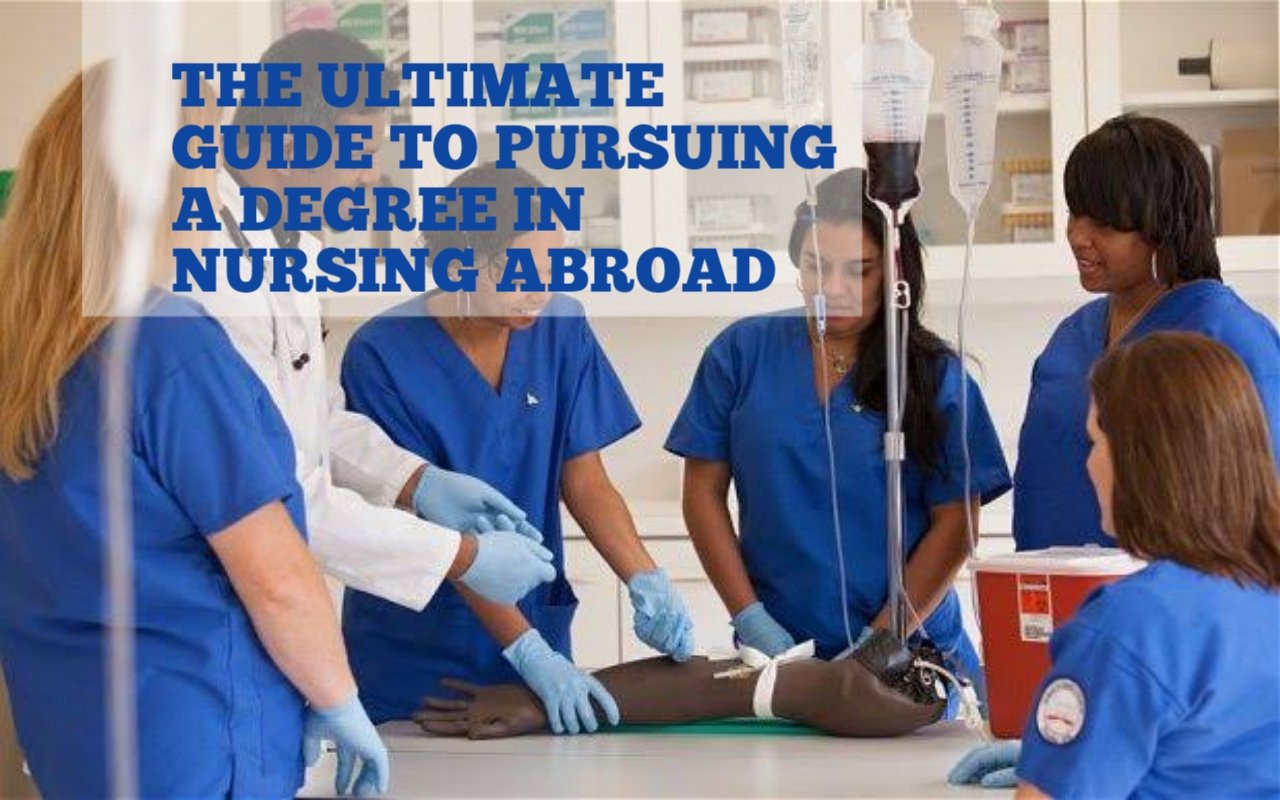THE PROFOUND BENEFITS OF STUDYING NURSING ABROAD
Unveiling the Global Horizon: THE PROFOUND BENEFITS OF STUDYING NURSING ABROAD

There is a constant need for qualified nurses in the fast-paced healthcare industry. It can be expensive for prospective overseas students who have a strong interest in nursing. Thanks to the abundance of fully funded nursing scholarships available, access to top-notch education without the stress of paying for tuition has been made possible.
So, the reason you’re here is to pursue a nursing career overseas. Or perhaps you’re still toying with the notion but aren’t sure if you should go ahead and commit. Perhaps it’s none of those things, and you just happened to end up here.
Regardless of your motivation, this article focuses on the advantages of working as a nurse abroad and explains why you should consider it a necessity rather than a luxury.
Studying nursing overseas is a life-changing experience that offers prospective nurses numerous advantages outside of the classroom in an age when healthcare transcends national boundaries. Here, we explore the various benefits that result from choosing to pursue nursing school abroad https://wiredinto.com/index.php/2024/01/15/THE PROFOUND BENEFITS OF STUDYING NURSING ABROAD/.
Nurses are essential to providing high-quality patient care in the dynamic sector of healthcare. Acquiring international nursing experience can be a life-changing event for individuals searching for both professional development and a wider outlook. This post examines the advantages, difficulties, and doable actions to start down this fulfilling route.
Understanding The Benefits: The Profound Benefits Of Studying Nursing Abroad
- It looks amazing on your resume
- Cultural Competence
- fluency in Language
- Learn What NURSING Means Around THE WORLD
- Embrace Diversity
- Adaptability
It Looks Amazing on Your Resume
Nothing conveys “employability” more than a résumé chock-full of abroad nursing experience. Your time spent overseas will stand out on an application when it is reviewed by a prospective employer. The words “resourceful, resilient, and determined will be on their minds. One of our previous travelers, who is currently employed in Southern Africa with a significant global health charity, said the following:
 An overseas internship is a great way to demonstrate your adaptability, ingenuity, and cross-cultural competency on your CV. It says you have seen and experienced things that people in the US and other counties don’t know about. Employers are aware that Work the World helps you become a better physician and global citizen in a variety of ways. – Brevetti, John Hansen.”[…] graduates who studied abroad as part of their degree are 24 percentage points more likely to find employment 3 years after graduation relative to their non-mobile peers,” according to 2013 research. (2013, Di Pietro).
An overseas internship is a great way to demonstrate your adaptability, ingenuity, and cross-cultural competency on your CV. It says you have seen and experienced things that people in the US and other counties don’t know about. Employers are aware that Work the World helps you become a better physician and global citizen in a variety of ways. – Brevetti, John Hansen.”[…] graduates who studied abroad as part of their degree are 24 percentage points more likely to find employment 3 years after graduation relative to their non-mobile peers,” according to 2013 research. (2013, Di Pietro).
The greatest benefit, though, is the metamorphosis of the individual that most travelers go through, the lifetime relationships they create with locals, the understanding of their potential, and the course they wish to go. Engaging in work, internships, or volunteer work overseas can enhance one’s CV and offer valuable experiences that are unavailable in one’s native country.
In the medical and health sciences, working overseas can provide travelers with access to public health subjects that are not frequently addressed at home, as well as the chance to hone their intercultural communication skills and learn how to handle novel and unusual situations.
Prospective employers will be able to see that you are adaptable, driven, and committed to the larger good.
Cultural Competence
Immersion in other cultures can be a useful experience when studying nursing abroad. Through the process of navigating healthcare systems outside of their native country, students gain valuable insight into cultural nuances and cultivate cultural competency. In a world where patient populations are becoming more and more diverse, this ability is essential. Traveling abroad improves cultural competency, which is essential for delivering patient-centered care.
Fluency in Language
Our teacher who speaks Nepalese goes over translations of diseases.
Your brain stays healthy when you practice a second, third, or even fourth language. It’s practical in daily life, appealing to employers, and, let’s face it, just plain amazing.
In many foreign nursing programs, instruction is given in English or another commonly spoken language. Students now have the chance to improve their language skills, which are becoming more and more important in the global healthcare sector.
You can interact on a far more personal level with patients from the nation you’re working in if you put in the effort to learn the language. It will also improve your experience and gain you the respect of the medical community in your area. Couple that with the experience you’ll gain in the local healthcare system and you’ll be an unstoppable force [notice that we provide weekly language courses in our residences geared towards preparing you for your clinical experience].
Learn What NURSING Means Around THE WORLD
Sharing your country and culture’s skills and expertise with like-minded individuals overseas is a unique opportunity that comes with becoming a nurse abroad. Even better, it benefits both parties; if you have an open mind, you’ll learn skills that will advance your career.
The impact is amplified if you are a student because working at a teaching hospital will pair you with other nursing students. You can discuss the variations in what you’re learning and how you’re being taught.
“I now value the things we have back home much more. The resourcefulness of the local nurses, who made neonatal oxygen masks out of cut-to-size dextrose bottles and made hand splints out of cardboard boxes and paper, as well as their ability to deliver services and supplies to patients, also astounded me. The wastefulness of our habits back home was also brought home. – Ashleigh Buncombe Paul, Iloilo, Philippines. Learning what the term “nurse “means in a global context is one of the most important lessons to be learned from an international internship. Ultimately, the approaches, customs, convictions, and principles of nurses vary based on one’s geographical location.
You deserve to seize the opportunity to try nursing overseas. Why not put yourself ahead of the pack and steer your career as a nurse towards something extra special?
Embrace Diversity
Be mindful of cultural variations in the healthcare context and maintain an open mind. A nursing student studying abroad has numerous opportunities to appreciate diversity.
They will get insight on how to deliver care that is sensitive to cultural differences when they get back home. They can also get knowledge about the various healthcare requirements of the community, which will enable them to deliver care that is more efficient.
Lastly, they can try to interact with and absorb knowledge from the local community, which will enable them to form bonds and improve their comprehension of the local way of life. Students studying nursing abroad can improve their abilities and gain a more global perspective in this way.
Adaptability
Learn to be flexible to adjust to new work settings and procedures
Any student studying nursing abroad needs to be able to adapt. They will have to adjust to new routines in a new setting, which may include alternative approaches to healthcare delivery. Additionally, they might have to adjust to new cultural standards, such as learning a new language or recognizing different social signs.
They might also need to adjust to a new work environment, which could include a different healthcare system or a different approach to communicating with families and patients.
Lastly, they might have to adjust to the rigors of a new schedule, including a shift in work hours or time zone. These modifications all call for a high degree of
Exploring the Diverse Categories of Scholarship: The Profound Benefits Of Studying Nursing Abroad
Scholarships are essential in determining how many people can pursue their educational goals. When we dig deeper into the world of scholarships, we find that they fall into a wide range of categories, each with its own set of requirements and goals.
Academic Scholarship
Scholarships, which honor exceptional accomplishments in areas like GPA, standardized test scores, and overall academic performance, are frequently given out in recognition of academic brilliance. With the prevalence of these scholarships, students are inspired to pursue academic achievement at both the high school and college levels.
Merit-Based Scholarship
Merit-based scholarships honor outstanding achievements in a variety of disciplines, such as athletics, the arts, leadership, and community service, in addition to academic achievement. The goal of these scholarships is to find well-rounded people who make a variety of contributions to their communities.
Need-Based Scholarship
Need-based scholarships are given to students who have shown a financial need to remove financial barriers to study. The goal of these scholarships is to guarantee that gifted people can pursue higher education, irrespective of their financial situation. https://wiredinto.com/index.php/2024/01/15/THE PROFOUND BENEFITS OF STUDYING NURSING ABROAD/..
Subject-Specific Scholarship
Numerous scholarships are awarded to students who show interest and excellence in particular disciplines of study, such as the humanities, social sciences, or STEM (science, technology, engineering, and mathematics). The goal of these scholarships is to encourage the growth of specialized knowledge in particular academic fields.
Minority Scholarships
Recognizing the importance of diversity in education, minority scholarships are designed to support underrepresented groups, including ethnic, racial, and gender minorities. These scholarships contribute to fostering inclusivity within educational institutions.
International Scholarships
International scholarships offer chances for students from all around the world to pursue education in other nations as globalization keeps connecting the world. These grants encourage cooperation and cross-cultural exchange.
Career Specific Scholarships
Certain scholarships are designed to encourage people to continue studying subjects that have a high demand or societal impact, while also catering to particular career routes. Scholarships for professions in education, nursing, or technology are a few examples.
Entrepreneurial Scholarships
The engine of innovation and economic expansion is entrepreneurship. Intending to encourage creativity and business aptitude, these scholarships help budding entrepreneurs.
Best Nursing School for International Students
- Colombia School of Nursing is located in New York City.
- The University of Pennsylvania School of Nursing (Penn Nursing).
- Johns Hopkins School of Nursing, Baltimore, MD 21218, USA.
- The University of Manchester in the UK.
- McGill University in Canada.
- Monash University in Australia.
- The University of Tokyo in Japan.
ELIGIBILITY CRITERIA

There are numerous reasons why becoming a nurse is a fantastic career choice. You know you’ll always have work, even if you get to save people and save lives daily. On top of that, every day is a brand-new adventure. At what point is enrollment in a nursing program mandatory? Is it possible to pursue a Master’s degree in a field without first completing a Bachelor’s? In this post, we’ll address those queries along with others. Bachelor in Nursing application requirements
There are some broad expectations you can have of what you’d need to get into one of these degrees, even though the application criteria for a Bachelor’s in Nursing vary by university and nation.
Required Documents: The Profound Benefits Of Studying Nursing Abroad
A study application requires a plethora of documentation. Here are a few instances:
Academic Requirements
Career Prospects
A resume showcasing pertinent nursing experience
reference letters from previous employers or instructors
A motivation letter or autobiography
Evidence that you have paid the application fee (if applicable)
The complete list of required documents is available in the application or on the university website. A high school diploma or equivalent with a heavy concentration in biology and chemistry. Certain standardized test results, like the TOEFL or IELTS, may be required by certain universities for English competence. The degree requirements grade requirements are frequently influenced by how esteemed or well-regarded the university is. When applying for a nursing degree overseas, you can encounter the following grade requirements:
You must fulfill the prerequisites for admittance to study nursing overseas. In general, you need the following for a BSc Nursing degree, though they may vary depending on the institution:
- An education that includes at least one of the following fields: applied science, biology, psychology, physics, or health and social care.
- The minimum requirement for your certificate is an International Baccalaureate of 30 points with three topics at a higher level, including a science subject at grade 5 or above, or the equivalent of a BBC A-Level score. This SAT result consists of 600 on three SAT subject tests and 1290 on reasoning.
Language Requirement
It is crucial to find out from your prospective university if your current degree is acceptable or relevant.
IELTS: a minimum score of 6.5 in the writing test and a minimum score of 7 in the reading, listening, and speaking sections
TOEFL iBT: a minimum score of 75 to 90 or higher, with minimum scores for each of the individual sections also feasible
PTE Academic: 44 to 61 points or higher
A score of around 176 or higher on the Cambridge English C1 Advanced (previously CAE) or C2 Proficiency (formerly CPE) exam
The university website, which is frequently also where you may submit your application, has a list of all criteria. Make sure to visit this page to learn about their precise needs. After all, the figures above are merely averages. Is a Bachelor’s in Nursing required to enroll in a Master’s program in nursing? Sure, in certain circumstances!
First off, you can pursue an expedited Master of Science in Nursing (MSN) if you have prior nursing experience or a Diploma in Nursing. By skipping the bachelor’s degree and going straight from an associate’s or diploma in nursing to an MSN, you can save a significant amount of money. You will study subjects including pharmacy, ethics, and healthcare policy while pursuing an MSN.
But what if you already hold a bachelor’s degree, even if it isn’t in nursing? You still have time to complete your Master’s degree, but it will take more effort. A bachelor’s degree in nursing will cover roughly eighteen months of coursework at universities where you can pursue an MSN with another bachelor’s degree.
You will receive training in all of it before you start the Master’s program, and you can start as soon as you pass NCLEX registered nursing certification exam.
BENEFITS OF STUDYING NURSING ABROAD

Global Perspective
Students gain a worldwide outlook through exposure to a variety of healthcare settings, which improves their understanding of healthcare potential solutions.
Cultural Proficiency
Interacting with patients from varied cultural backgrounds builds cultural competence, an essential ability in today’s interconnected healthcare system.
High-Quality Education
World-class nursing education is available in many nations, complete with state-of-the-art facilities, knowledgeable faculty, and cutting-edge technology.
Career Opportunities
Graduates of international nursing programs can work abroad or participate in global health initiatives, among other expanded employment options.
Personal Development
Personal development and adaptability are desirable traits in the ever-evolving healthcare industry, and living and studying overseas fosters these traits.

